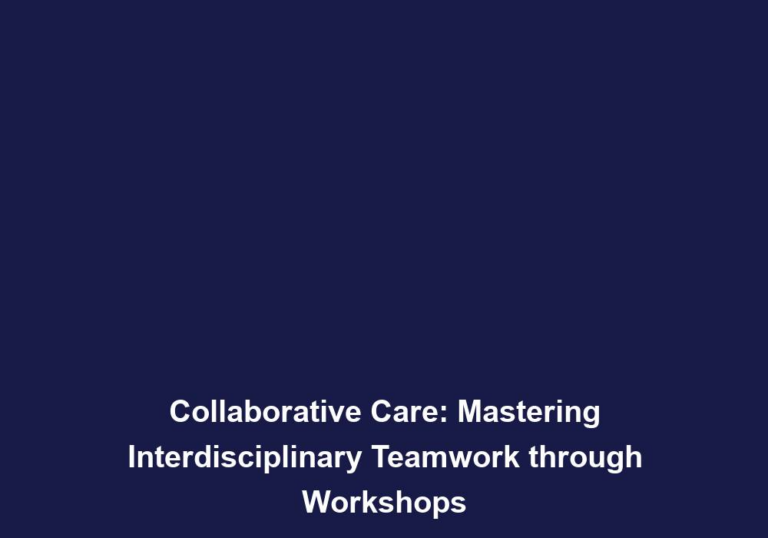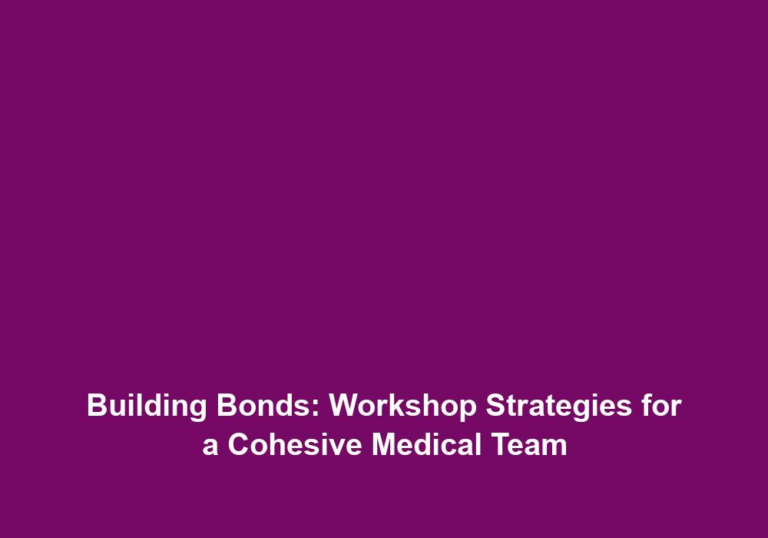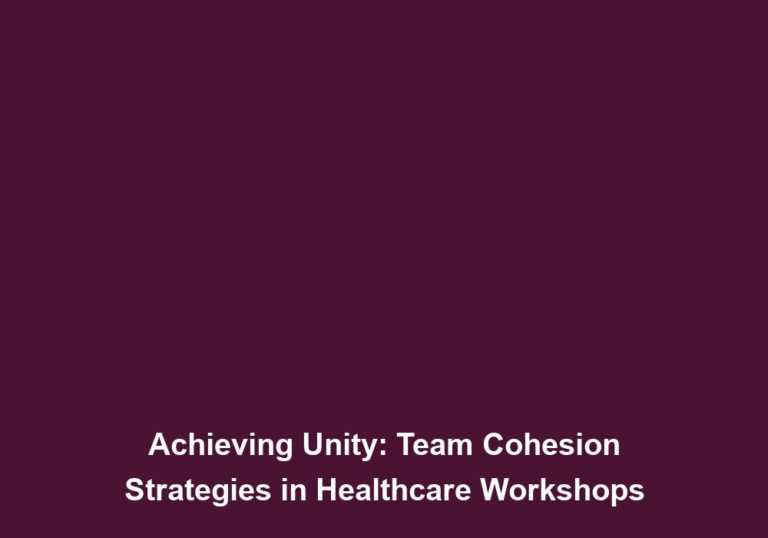Bridging Disciplines: Interdisciplinary Collaboration Workshops in Healthcare
In the rapidly evolving field of healthcare, interdisciplinary collaboration has become essential for providing high-quality patient care and achieving better health outcomes. As healthcare professionals from various disciplines work together, they bring their unique perspectives, expertise, and skills to address complex healthcare challenges. To foster effective collaboration and enhance interdisciplinary teamwork, healthcare organizations are increasingly turning to interdisciplinary collaboration workshops.
What are Interdisciplinary Collaboration Workshops?
Interdisciplinary collaboration workshops are structured events designed to bring together healthcare professionals from different disciplines to exchange knowledge, share experiences, and develop a shared understanding of effective collaboration. These workshops provide a platform for participants to learn from one another, develop mutual respect, and build strong working relationships.
Benefits of Interdisciplinary Collaboration Workshops:
-
Holistic Patient Care: Interdisciplinary collaboration allows healthcare professionals to consider patient care from a holistic perspective. By incorporating diverse viewpoints, healthcare teams can develop comprehensive treatment plans that address not only the physical aspects of a patient’s health but also their emotional, social, and psychological well-being. This comprehensive approach leads to better patient outcomes and overall well-being.
-
Improved Health Outcomes: When healthcare professionals collaborate across disciplines, they can leverage their collective expertise to devise innovative and personalized approaches to patient care. This interdisciplinary approach has been shown to improve health outcomes, reduce medical errors, and enhance patient satisfaction. By combining the knowledge and skills of multiple disciplines, healthcare teams can provide more effective and tailored care that meets the unique needs of each patient.
-
Enhanced Problem-Solving: Complex healthcare challenges often require multiple perspectives to be effectively addressed. Interdisciplinary collaboration enables healthcare professionals to pool their knowledge and skills, leading to more informed decision-making and creative problem-solving. By engaging in collaborative problem-solving, healthcare teams can identify innovative solutions and overcome barriers that may not have been possible with a single-discipline approach.
-
Professional Development: Engaging in interdisciplinary collaboration allows healthcare professionals to expand their knowledge and learn from others’ expertise. By working alongside professionals from different disciplines, individuals can enhance their own skill set, acquire new insights, and develop a broader understanding of healthcare practices. This continuous learning and professional development contribute to the growth and advancement of healthcare professionals.
Key Components of Interdisciplinary Collaboration Workshops
Interdisciplinary collaboration workshops consist of several key components that contribute to the success of the event and the development of effective collaboration among healthcare professionals.
-
Educational Sessions: Interdisciplinary collaboration workshops typically involve educational sessions that focus on topics related to effective collaboration, communication strategies, and understanding the roles and responsibilities of different healthcare disciplines. These sessions provide participants with a solid foundation for collaboration by ensuring they have a shared understanding of interdisciplinary teamwork.
-
Team-Building Activities: To foster strong working relationships, interdisciplinary collaboration workshops often include team-building activities. These activities aim to improve communication, trust, and cooperation among participants, enabling them to work together more effectively. By engaging in team-building activities, healthcare professionals can build rapport, establish common goals, and develop a sense of camaraderie that enhances collaboration.
-
Case Studies and Simulations: Case studies and simulations are commonly used in interdisciplinary collaboration workshops to provide participants with real-life scenarios that require collaborative problem-solving. These exercises allow healthcare professionals to apply their knowledge and skills in a supportive learning environment. By engaging in case studies and simulations, participants can practice interdisciplinary problem-solving and develop the ability to work collaboratively in complex situations.
-
Facilitated Discussions: Facilitated discussions provide a platform for participants to openly share their experiences, challenges, and insights related to interdisciplinary collaboration. These discussions promote reflection, mutual learning, and the identification of best practices. By engaging in facilitated discussions, healthcare professionals can learn from one another’s experiences, exchange ideas, and develop a deeper understanding of effective interdisciplinary collaboration.
Benefits of Interdisciplinary Collaboration Workshops
Interdisciplinary collaboration workshops offer numerous benefits for healthcare professionals and organizations seeking to enhance collaboration and improve patient care.
-
Improved Communication: Interdisciplinary collaboration workshops enhance communication skills among healthcare professionals. By learning to effectively communicate with individuals from different disciplines, participants can minimize misunderstandings, streamline workflows, and improve patient care coordination. Effective communication is essential for ensuring that all members of the healthcare team are on the same page and working towards common goals.
-
Enhanced Teamwork: Through team-building activities and facilitated discussions, interdisciplinary collaboration workshops foster a sense of camaraderie and teamwork among healthcare professionals. This improved teamwork translates into better coordination and collaboration in the workplace. By building strong working relationships and fostering a positive team dynamic, healthcare professionals can work together more efficiently and effectively.
-
Increased Job Satisfaction: When healthcare professionals are given the opportunity to engage in interdisciplinary collaboration and contribute to the development of comprehensive care plans, they experience increased job satisfaction. Collaboration allows them to make a meaningful impact on patient outcomes and fosters a sense of professional fulfillment. By participating in interdisciplinary collaboration workshops, healthcare professionals have the opportunity to contribute their expertise, learn from others, and actively contribute to improving patient care.
-
Continued Professional Development: Interdisciplinary collaboration workshops provide healthcare professionals with valuable continuing education opportunities. By participating in these workshops, individuals can earn continuing education credits and stay up-to-date with the latest advancements in their field. This continuous learning and professional development contribute to the growth and advancement of healthcare professionals, ensuring that they are equipped with the knowledge and skills necessary to provide high-quality care.
Conclusion
Interdisciplinary collaboration workshops in healthcare play a crucial role in bridging the gap between different healthcare disciplines and promoting effective teamwork. These workshops equip healthcare professionals with the skills, knowledge, and mindset required to deliver holistic patient care, improve health outcomes, and overcome complex healthcare challenges. By investing in interdisciplinary collaboration, healthcare organizations can foster a culture of collaboration, ultimately leading to better patient care and improved healthcare outcomes.







